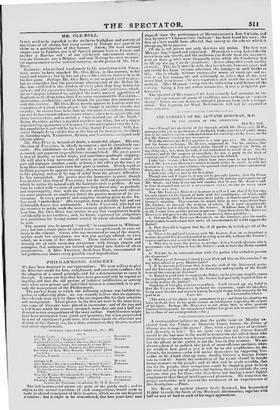MR. OLE-BULL.
ITALY used to be regarded as the exclusive birthplace and nursery of tmeh jails of all classes, but every country in Europe new puts in its claim to a participation of this honour. Amona the most eminent
singers now in London, one is of Spanish parents born in France, and another a Russian serf : of our celebrated instrumental visitor-, two are Germans. one a Belgian : and now Norway has sent its trusi. cal representative to the musical congress, in the person of Mr. OLE- BULL
LAPORTE, who profited handsomely by his association with PAGA- NINI, seems to have attached Mr. OLE- Boas, in like manlier, to his bourse and interest; but he has not played his cards so dextrously as in his first game. Perhaps Mr. OLE -Rm. is not so good a card to play : but we remember how the portentous physiegoomy of the Italian fid- dler was exhibited in the window of every print shop long before his arrival ; and the successive doubts, hopes, hairs, and exaltations, which, the newspapers informed us, agitated the entire musical population of England, as the despatches from PAGANIN1 announced the possibility- uncertainty—probability—and at length the gracious determination to visit this country. Mr. 0 an-Boat. merely appears in London with the reputation of a great violin-player: his visage is neither ghastly nor swarthy ; he cannot have been shut un ten years in a solitary dungeon, nor can he have murdered one or two wives,—since he is, apparently. not above twenty-three, and is withal a " fair-skinned son of the North." Being, therefore, neither a reputed muricrer nor felon, but of a simple unpre tending appearance nod manner, his attractive power over the Lon- don population is and will he far less than that of I'AGANINi. Still, La- P0111 E thought fit to exhibit him as the lion of his menage' ie, in which, on Saturday night, TAMBURINI, Roots', and I—undo:lin, occupied only inferior places. Mr. OLE- BI'LL is, beyond all doubt, a wonderful player. His aim, like that of PAGANINI, is chiefly to surprise ; and he completely suc- ceeds. His exhibitions on the violin are a series of difficulties sur- mounted, and apparent impossibilities accomplished. His great power is that of double, or rather triple, and sometimes quadruple stopping. He will play a long succession of octave passages, then sustain one part and arpeggio another, (such, at least, is the effect on the ear,) or keep three and sometimes even four parts in motion. Merely rapid or brilliant passages he appears to scorn ; they occur comparatively seldom in his playing, and as if by way of relief from the greater difficulties he has vanquished. His power over the harmonics is great, though less absolute than that of PAGANINI; but the skill and precision with which he unites the natural with the harmonic scale is perfect. At one time he ended with "a note of sweetness long drawn out," so gradually and imperceptibly, that, with the closest attention, and amid silence the most profound, we could not detect the precise moment of its ter- mination. It was a practical and complete meaning given to the Ita- lian word " perdendosi." His reception, from a tolerably full and not fashionable house, was enthusiastic. Unlike PAGANINI, who had not the courtesy to invite event the most eminent professors of London to hear him, Mr. OLE-BULL was anxious to pay that compliment largely and liberally to his brethren ; and, we know, expressed his obligations to a gentleman for having named several to whom admissions should be sent.
The concert was designated "sacred," in compliment to Whitson. eve; but not a single piece of sacred music was performed, or even set down in the scheme. Gatsi, who was announced as one of the singers, neither made her appearance, nor was any apology offered, or even naked, on account of her absence. These violations of truth and decency are of such every-day occurrence with foreign singers and managers, that audiences are trained and tamed into habits of silent acquiescence. A Miss TairrTna, fresh from Paris, concentrated in her performance almost every possible vocal imperfection.


























 Previous page
Previous page